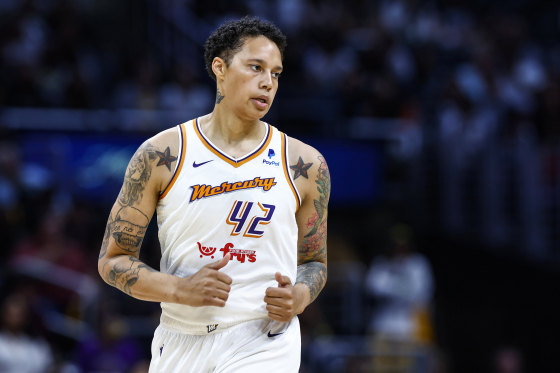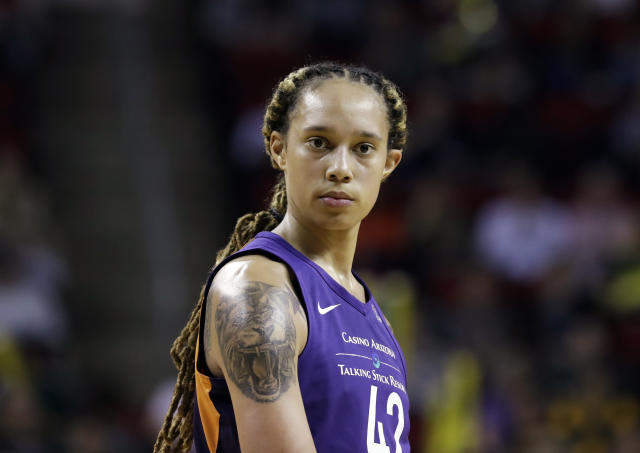Lin Dunn Calls for Brittney Griner’s Expulsion from U.S. Olympic Team: A Controversy Over National Anthem Respect
The debate over patriotism in sports has once again sparked controversy, this time involving legendary basketball coach and current Indiana Fever director Lin Dunn and WNBA star Brittney Griner.
Dunn recently made headlines by demanding Griner’s expulsion from the U.S. Olympic team, citing the athlete’s past stance on the national anthem as disrespectful.
Dunn’s statement, “When you disrespect the American anthem, you don’t deserve to represent this country,” has ignited discussions across sports and political circles.
This renewed controversy underscores the ongoing debate over national representation, personal beliefs, and the role of athletes as social activists.
Background of Brittney Griner’s National Anthem Protest

Brittney Griner, an eight-time WNBA All-Star and two-time Olympic gold medalist, has been a vocal advocate for social justice.
Like many other athletes, she protested racial injustice in the United States by remaining off the court during the national anthem in 2020.
Her decision was in solidarity with the Black Lives Matter movement, which gained global momentum following the killing of George Floyd.
Griner, at the time, stated that she did not believe the national anthem should be played before games and that she would not participate in standing for it.
Her views aligned with other athletes who used their platforms to advocate for change, following in the footsteps of figures like Colin Kaepernick, who first kneeled during the anthem in 2016 as a protest against police brutality.
Lin Dunn’s Criticism and Calls for Griner’s Removal
Lin Dunn, a Hall of Fame coach with an extensive career in women’s basketball, expressed strong opposition to Griner’s past actions.
Her call for Griner’s removal from the U.S. Olympic team reflects a broader perspective that athletes representing their country should demonstrate unwavering patriotism.
Dunn’s remarks have resonated with individuals who believe that playing under the American flag comes with the responsibility of showing respect for national symbols, including the anthem.
Critics of Griner argue that her past refusal to stand for the anthem conflicts with the values of representing the United States on an international stage.
Brittney Griner’s Perspective: A Shift in Stance

Since her high-profile detainment in Russia in 2022 and her subsequent return to the U.S. following a prisoner exchange, Brittney Griner has spoken about how her experiences changed her perspective.
Griner, who was imprisoned for nearly 10 months on drug-related charges, acknowledged that her time in Russia made her view the United States differently.
Upon her return, she stated that hearing the national anthem again “definitely hit different” and that she had a newfound appreciation for her home country.
Some of her supporters argue that Griner’s past stance was a reflection of her right to free expression and that she should not be punished for past protests, particularly when she has since expressed a deeper connection to the anthem.
The Ongoing Debate: Patriotism vs. Freedom of Expression
The debate surrounding Griner’s place on the Olympic team represents a larger cultural divide in the United States.
On one side, many believe that athletes who wear the national colors should unconditionally respect American traditions, including the national anthem.
On the other, advocates of free expression argue that forcing athletes to conform to patriotic displays contradicts the very freedoms that the anthem symbolizes.
This divide is not new in sports. Similar debates have taken place in the NFL, NBA, and other professional leagues, where athletes have faced backlash for kneeling or refusing to stand for the anthem.
The discussion often intertwines with political ideologies, making it one of the most polarizing issues in modern sports.
Social Media and Public Reactions
The public reaction to Dunn’s comments has been split.
Some social media users and sports analysts support her stance, asserting that athletes who protest the anthem should not have the privilege of representing the country internationally.
Others argue that Dunn’s position is outdated and fails to recognize the importance of athletes using their platforms to highlight social injustices.
Conservative voices in the media have largely echoed Dunn’s sentiment, while progressive commentators have defended Griner, emphasizing her right to protest and her changed perspective after her detainment in Russia.
Implications for the U.S. Women’s Basketball Team
The controversy raises questions about how the U.S. Olympic team and governing bodies like USA Basketball handle political expressions among athletes.
While the Olympic Games have long been a stage for athletic excellence, they have also been a platform for political statements, from Tommie Smith and John Carlos’ raised fists in 1968 to protests during the Tokyo 2020 Olympics.

Whether or not Griner faces any consequences from Dunn’s remarks, this incident will likely fuel broader discussions within the team and USA Basketball leadership regarding athlete activism and national representation.
Lin Dunn’s call for Brittney Griner’s removal from the U.S. Olympic team over her past anthem protests highlights the ongoing tension between patriotism and freedom of expression in sports.
While Dunn and her supporters believe that representing the U.S. should come with a demonstration of national loyalty, others argue that athletes should have the right to express their beliefs, even on international stages.
As the 2024 Paris Olympics approach, this debate will likely continue, with conversations about national identity, representation, and the evolving role of athletes as social activists taking center stage.
Whether Brittney Griner remains on the team or not, this controversy is a reflection of a larger societal conversation about what it truly means to represent a nation on the world stage.

